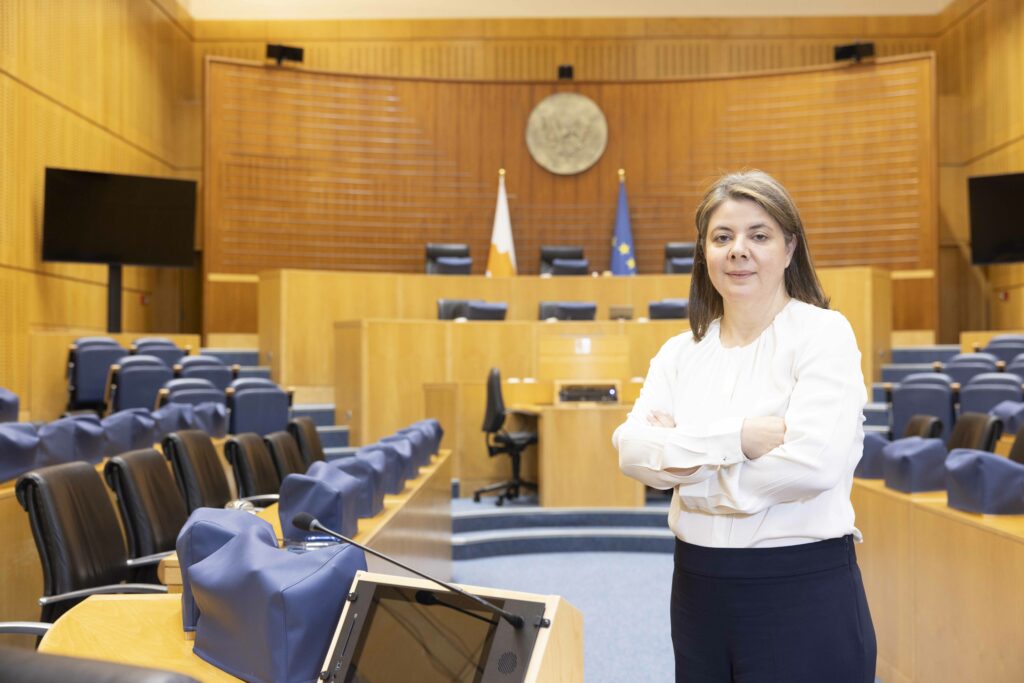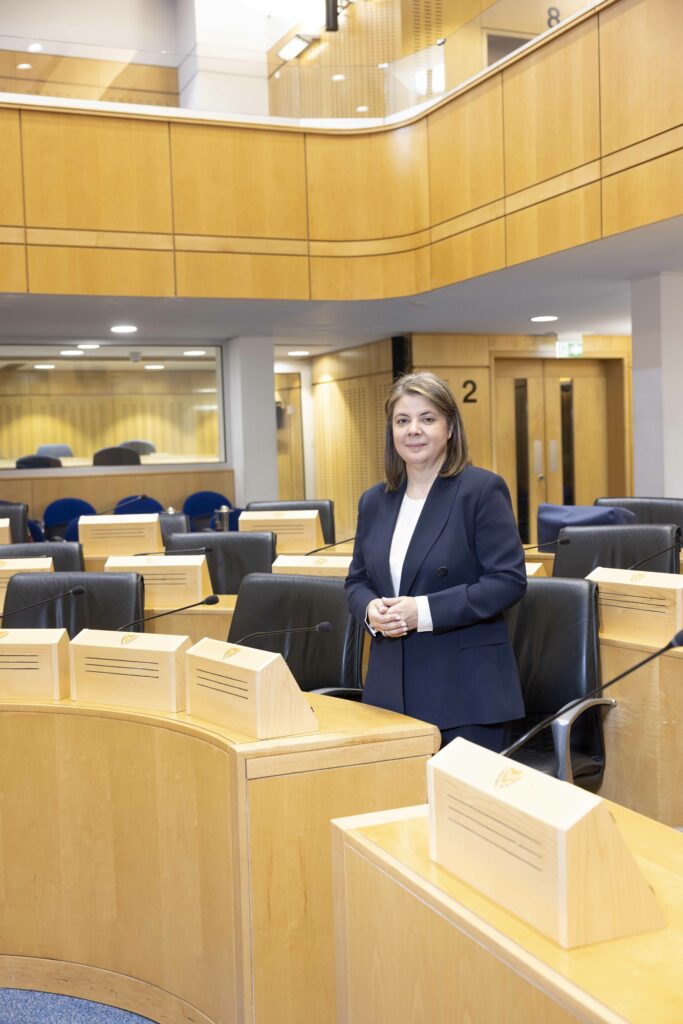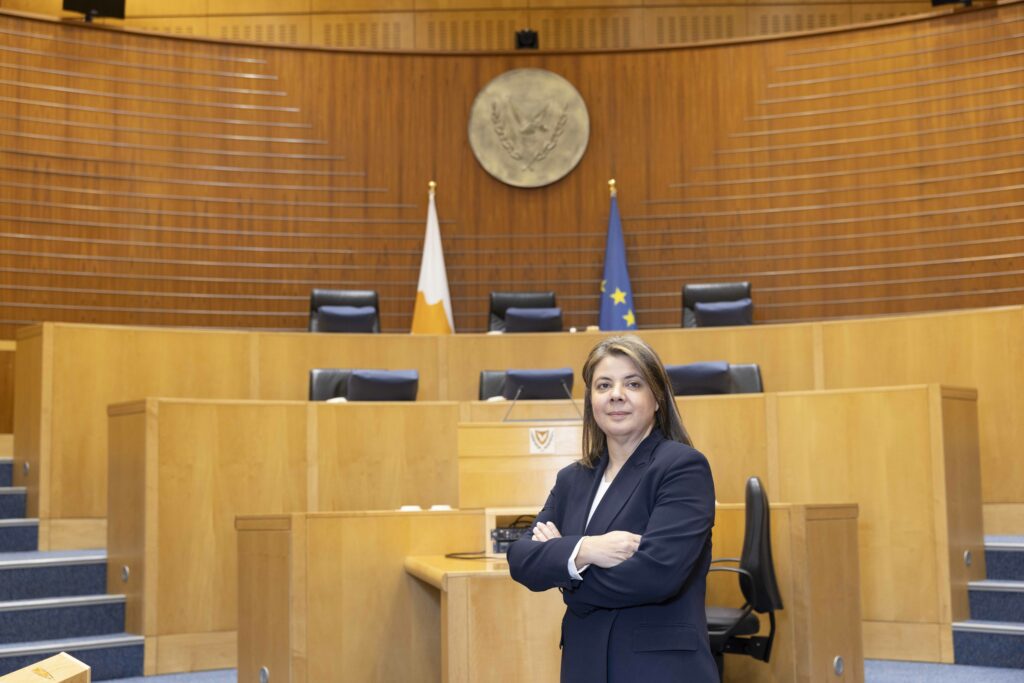Filenews 27 October 2025 - by Eleftheria Paizanou
The deputy president of DIKO and chairwoman of the Parliamentary Committee on Finance, Christiana Erotokritou, in an in-depth interview: She opens her cards on the hot issues of the economy that will be discussed in the coming weeks in Parliament and also on the parliamentary elections of May 2026.

It is characteristic that, despite the busy schedule, no timetable has been lost in recent years. The work of the Commission proceeds consistently and within the established frameworks, which is due both to the responsibility of the members of the Commission and to the effective support of the secretariat.
What can really create pressure is when bills are tabled late, which reduces the time available for in-depth consideration. I say this not critically, but with a desire to underline the importance of timely planning and the institutional respect that must exist between those involved.

What are your initial findings on the state budget for the year 2026? Do you spot funds that contain fat? If so, what are they?
The 2026 state budget confirms that the Cypriot economy continues to move on a stable trajectory. Fiscal figures remain healthy, public debt is de-escalating and the state's ability to support society and growth in a targeted manner is maintained. These are positive and must be recognized.
But beyond the numbers, the essence is whether each expenditure makes sense, whether it pays off and whether the public investment brings real results in a timely manner. And there, yes, we find room for improvement – not necessarily "fat" in the sense of waste, but areas where funds do not translate into work or impact.
For example, this year too it is observed that some development projects remain on paper, with low absorption rates. This is also reflected in the low implementation rate of development spending. In practice, it means that we budget expenses without attributing the expected benefit to society and the economy. It is a perennial issue, which must be resolved, as time is indeed money.
Do you think that through the budget there could be additional regulations for the benefit of citizens and businesses?
The answer is in the affirmative. The budget is not just an accounting table of revenues and expenditures, but it is the main tool for exercising economic and social policy.
In my opinion, there are specific directions where the budget can work in favour of citizens and businesses: primarily by determining investments in sectors that increase the dynamics of the economy and strengthen the country's infrastructure, such as digital transformation, green transition, research, innovation and human capital.
These are the main axes of the economy of the future that we must understand. At the same time, through the budget, the state must define targeted social policies, which give real breathing space to vulnerable groups, but without promoting dependency. Social spending has value when it is transformed, where justified, into opportunities and not into permanent subsidy mechanisms.
Therefore, a citizen and business-friendly budget is not the one that spends more, but the one that spends smarter and more efficiently.

Could it be that due to the pre-election period, DIKO will not be so strict this year in the amendments to reduce expenditures that it will submit to the state budget, given that the economy is moving at a high pace?
DIKO is today on the side of the coalition government, but it has always exercised and is exercising a responsible and rational policy. Even in the past, when we were in opposition, our amendments and the "crossing" of funds were measured and correct, because they aimed to strengthen transparency, fiscal discipline, the proper functioning of the state and the proper investment of state resources.
Our stance is timeless and firm: we exercise parliamentary control not to create impressions, but to ensure that the economy remains healthy and reliable while avoiding risks. This is what we will do now. The pre-election period does not change our philosophy, as long as seriousness in politics does not have "pauses", nor "electoral breaks". For us, the interest of the economy and the citizen is above the conjuncture.
TAX REFORM
How do you comment on the tax reform bills? Are the differentiations in revenues and expenses incorporated into the state budget or do changes need to be made after the budget?
Tax reform is an extremely important breakthrough, which can redefine the tax landscape and enhance the competitiveness of the economy.
However, the relevant bills have not yet been submitted to the Parliament, but nevertheless I believe that the differences have been taken into account and the necessary changes have been made.
You have stated that you are in favour of approving the tax reform in two instalments, due to time pressure. That is, the bills concerning taxation to be approved before the end of the year and the regulations concerning the measures against tax evasion with the new year. Do you think this is practically applicable?;
Measures against tax evasion must be a constant priority of every government, regardless of whether a tax reform is underway. In other words, if we did not have tax reform on the horizon today, would we stop proposing new measures to crack down on tax evasion? Obviously not. These are two different policy axes, these are two separate objectives.
The tax reform must focus on boosting growth, incentivising new sectors of activity, simplifying and modernising existing rules, correcting tax rates and generally enhancing the competitiveness and prospects of the Cypriot economy.
We expect these to be reflected in the bills that will be submitted to the Parliament. On the other hand, the measures against tax evasion concern the strengthening of the correct tax collection tools but also the strengthening of the fairness and credibility of the system.
As for the proposal for voting in "two instalments", this resulted from the fact that we have not yet submitted the bills before us and therefore there is time pressure. Those related to tax evasion and tax collection require more complex preparation, since they provide for specialized implementation mechanisms.
Under these circumstances and bearing in mind that there are only ten weeks left until the end of the year, the proposal for voting in two stages emerged. Ideally, the course would have been parallel, but I don't see how realistically we can handle the issue of delay differently.

Why don't you postpone the approval of the entire legislative package to the beginning of 2026?
I do not rule it out, provided that there is a common understanding and understanding beforehand. However, I must emphasize that the approach of the two phases reflects responsible planning. The first part of the reform, which concerns taxation, is directly linked to the state budget and fiscal forecasts. It has already been announced, creating expectations among taxpayers. It is therefore logical to proceed before the end of the year, so that there is clarity and stability in economic policy.
On the contrary, the part concerning tax evasion requires more technical processing, time and cooperation with the competent services. The whole reform should not be delayed because of its more complex part.
Where are your main reservations focused on tax reform? Do you share the views expressed by the professional bodies that there was not sufficient consultation?
Our reservations are not related to the necessity of reform – that is a given. However, they concern the way and the pace at which it is promoted and provided, always with a reservation precisely because we do not yet have before us the completed bills.
There are issues that require careful analysis, such as the impact on small and medium-sized enterprises, the balance between tax fairness and competitiveness, and the administrative burden on taxpayers that needs to be reduced.
As far as consultation is concerned, I have always maintained the view that dialogue must be exhausted. A tax reform cannot be done with a bureaucratic approach "from above". It must be based on dialogue with those who will put it into practice.
With the safeguards included by the Ministry of Finance in the bills, especially on the issue of measures against tax evasion (sealing of businesses, determination of salaries of business executives, etc.), have your concerns been somewhat dispelled?
The fight against tax evasion is an absolutely necessary goal and we support it. However, the approach must be balanced. It cannot be pursued through overly strict or "police" provisions that ultimately make the economy unattractive and dissuasive for investment. International experience shows that tax evasion is effectively reduced not through repressive measures but through modern tools of compliance, digitization of procedures and strengthening of tax awareness. In Greece, for example, the reduction of tax rates was combined with technological solutions and targeted supervision, with the results being spectacular. The administrative burden on taxpayers has been dramatically reduced. Therefore, Cyprus must move towards a smart tax system that maintains and enhances the country's comparative advantages, that will facilitate growth and healthy entrepreneurship, while ensuring fairness and compliance by activating modern efficient tools for tax collection.

But due to the upcoming elections, do you think it is the right time to change the country's tax system?
Tax reform must be done when the economy needs it. When new goals need to be set, the system needs to be modernized, better aligned with best practices, new incentives for growth, social balance and competitiveness. If the economy needs to be readjusted, then this must be done regardless of the elections or not.
The only thing to be avoided is to use the reform as a tool of political rhetoric or populism. Taxation is not a field for impressions – it is the foundation of economic stability and social justice.
What other measures could be included in the tax reform?
I would like to see in the reform incentives for young professionals and businesses, such as zero or reduced rates for those under the age of 30, to support youth entrepreneurship. Incentives also for the employment of young people, so that a position in the public sector stops being "the" dream.
Tax exemptions for investments in green energy and energy saving, in essential digitization to simplify procedures. Also, the reduction of taxation on labour would strengthen disposable income and competitiveness. Finally, a fair taxation of large profits and incentives for the repatriation of capital and scientists would give depth and social justice to the reform.
There are voices that this is a tax reform that favours the rich and big corporations. What is your position?
I do not agree with this levelling approach. First of all, because the limits of the tax-free allowance are increasing, they are increasing even more depending on the number of minor children, but also because the corporate tax is also increasing. So this criticism is both unsubstantiated and misplaced.
Tax reform must have a social character but also serve justice and development at the same time. If the measures create the feeling that they mainly benefit the economically powerful, then they lose their legitimacy in society. Therefore, the reform must aim to reduce and not to strengthen inequalities. At the same time, however, we cannot ignore that entrepreneurship and investment are the driving force of the economy. Therefore, the equation is delicate: we need a tax system that rewards production, not exploitation, and that incentivizes those who create jobs.
The Finance Committee also passed the bills for the Sanctions Unit, for the control of large developments and for the privatization of the CSE. Do you think that through the discussion that took place, the texts have been correctly formed?
I think so. Especially if one takes into account that when all the above bills were submitted to the Committee, there were substantial disagreements between those involved, strong objections and tensions. However, the elaboration in the Finance Committee and the substantive dialogue that followed resulted in the normalization, consensus and determination of mutually acceptable solutions that were not to the detriment of either the philosophy or the efficiency of the bill. So we started with a dead end and after the discussion in the Finance Committee we ended up sometimes with unanimity, sometimes with a strong majority. I therefore believe that the role of the Commission and its members has been extremely efficient and beneficial.

THE TERM OF OFFICE IN THE CHAIRMANSHIP OF THE FINANCE COMMITTEE
In May, your term as chairman of the Finance Committee ends. Was your task difficult? What would you change to improve the functioning of the Commission?
It was a particularly demanding but also very honourable term. The Finance Committee is the most burdened committee of the Parliament, with a huge amount of legislative work and political responsibility. We had to balance between fiscal discipline and social sensitivity and make decisions that directly affect the daily lives of citizens and businesses. Despite the difficulties, I am proud that no timetable was missed, we operated with transparency and consensus, and the Commission maintained a high level of institutional authority.
If I could change something, I would like better coordination with the ministries, so that bills are submitted on time and effective parliamentary control is strengthened. I would also like to strengthen the Finance Committee of the Parliament with a group of technocrats who would support its work but would also be able to monitor on a continuous basis the course of the economy of both the country and the countries in our region so that we have the opportunity to be one step ahead, ready to adapt our own framework to the needs of the region.
GOVERNANCE AND ELECTIONS
After all, is DIKO considered a co-governing party? I am asking this question because in many decisions taken by the President of the Republic, he does not seem to take you into account. Do you think it was a mistake to support Christodoulidis?
DIKO is a party that supports the stability of the country and the government, but always in terms of autonomy and institutional responsibility. The support we provide does not mean that we sideline our own judgment or that we accept every decision without comment.
As a party, we chose to support Nikos Christodoulidis because we believed that the country needs stability and responsible governance, not to secure personal benefits or political handling. Despite any differences or difficulties in reaching an understanding, our position remains that the country must be governed with consistency, transparency, strategic planning, vision and social sensitivity.
Lately we have seen an intense flirtation between DISY and DIKO for cooperation. Could this effort pay off in the election of the Speaker of the Parliament and the President of the Republic?
We have parliamentary elections ahead of us and for DIKO the main goal is to maintain our strength. A force that does not serve personal or party interests, but stabilizes the country – in contrast to those who seek to destabilize it for petty political reasons. If every time the newspapers write about "flirting" between parties it was true, then every day we would have weddings. Humour aside, the bottom line is that this is not the time to discuss Presidents of Parliament or the Republic. Now the priority is how to ensure that Cyprus remains stable beyond May 2026, with functioning institutions, a government that works together and a society that feels safe.
So far, polls show traditional parties counting losses in the parliamentary elections. That doesn't bother you;
Of course it worries me. It is also the reason why I often propose to my own party the necessity to make honest self-criticism and corrective moves, because we must recognize that society is not unjustly angry. There are issues that need to be addressed honestly and responsibly, and we have a long way to go in this. At the same time, however, we can only warn that, today, more than ever, we need seriousness, a plan, trust and honest dialogue and not impressions and populist moves.
For DIKO, the priority remains to listen to society, to improve and to offer stability and security, so that the country can continue to progress responsibly.
